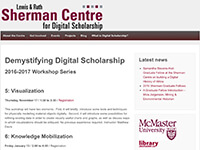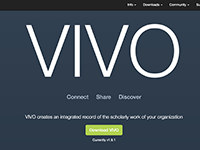Lewis & Ruth Sherman Centre for Digital Scholarship
Established in 2012
http://scds.ca/
Staff: 5 FTE + 1 postdoctoral fellow

In 2009, a $2.5 million gift from the Lewis & Ruth Sherman Foundation was exactly the impetus that McMaster University and its library needed to pursue their ambitions of establishing a digital scholarship center. The Shermans, a couple with long-held connections with rare books and libraries, were committed to education, learning, and research. So it is fitting that the gift from the foundation established in their names led to the launch of the Lewis & Ruth Sherman Centre for Digital Scholarship in 2012. The foundation’s generous gift not only subsidized the renovations for the Sherman Centre’s home on the first floor of Mills Memorial Library, it also provides ongoing support by underwriting some of the center’s operating costs.
ARL spoke with the Sherman Centre’s two directors: administrative director, Dale Askey, associate university librarian, Library and Learning Technologies; and academic director, Andrea Zeffiro, assistant professor, Department of Communication Studies and Multimedia. Askey and Zeffiro are joined by two full-time librarians, one full-time programmer, and one postdoctoral fellow. While the Sherman Centre is situated physically within the Mills Library, Askey noted that several important dotted-line relationships exist with other centers and services (such as the media center and GIS unit) situated elsewhere in the library.

The Sherman Centre for Digital Scholarship’s mandate is underpinned by a number of defining objectives. Specifically, the center works with digital scholarship researchers (faculty and graduate students) by providing consulting services and customized, scalable IT infrastructure, and any necessary technical support that may be required. This array of roles is reflected in the way in which the Sherman Centre furthers the institution’s research agenda. The center’s staff adopt an expansive, flexible approach to supporting each researcher, recognizing that digital scholarship needs will be influenced both by discipline and by level of expertise.
For example, an individual may visit the Sherman Centre with the barest outline of an idea, knowing only that they want to incorporate a digital component into their project. The center’s staff consult with that faculty member or graduate student to workshop and further articulate the idea and to explore appropriate digital methods and tools to meet the objectives. Similarly, when working with researchers who are seeking grant funding, Zeffiro emphasizes that the Sherman Centre makes a concerted effort to connect with them early in the process. In-depth consultation sessions help ensure that the applicant has an informed and realistic understanding of what is involved in including digital methods or tools in their application. The fundamental goal here is to ensure that successful grant applicants are able to hit the ground running so that their research can progress immediately and not be impeded by unanticipated obstacles. Zeffiro adds that faculty will often approach the center when they are looking for expertise outside of their own domain-specific knowledge and that this in turn can lead to interdisciplinary collaborations.

One of the powerful ways in which the Sherman Centre accelerates the integration of digital scholarship tools and methods into research and pedagogy at McMaster University is by means of the Graduate Fellowship in Digital Scholarship. The fellowship program is competitive, with up to three yearlong fellowships being awarded each year. Successful applicants are provided with a stipend, dedicated workspace, and access to professionalization activities (such as CV building and journal publishing) to name but a few of the considerable benefits the program affords. The fellows are, in turn, expected to contribute to the center’s activities through research presentations, blog posts, and the creation of a visualization for the Sherman media wall that represents an aspect of their work. (See Featured Projects below for descriptions of select fellows’ research works in progress.)
In tandem with its research support services, the Sherman Centre also aims to achieve an active pedagogical approach across campus, particularly within the social sciences and the humanities, although Askey has noticed that inquiries stemming from the health sciences are becoming more frequent than they were previously. The center offers a robust instructional program that includes a Demystifying Digital Scholarship Workshop Series (see Featured Projects below). These workshops have proven to be an effective means of disseminating information about digital scholarship methods and tools. In terms of integration into the curriculum, there is a one-unit course, entitled “Electronics for the Rest of Us,” for undergraduate students in the Arts & Science Program and Integrated Science Program. Students learn basic coding and how to use Raspberry Pi computers and Arduino technology, amongst other things. Zeffiro and Askey can imagine that greater course integration will likely occur in the future; they fully expect that such expansion will inevitably be accompanied by questions around scalability.
Not surprisingly, scalability is an issue that will need to be addressed. In the absence of a liaison librarian structure at McMaster, Sherman Centre staff encourage greater involvement by graduate students so that they too become familiar with tools and methodologies, thereby extending the reach of the center. Askey observes that graduate students can be ideal conduits for this kind of outreach, perhaps since they are not yet entrenched in a fixed disciplinary mentality.
Despite this reliance on graduate students, the fact remains that the Sherman Centre staff carry out an enormous amount of project consultation, assisting in project definition, providing support when expertise is in-house, and facilitating connections and referrals to campus partners when the expertise resides elsewhere. This reflects the inherent ethos of the center, which aims to provide guidance while promoting self-sufficiency in order that it may serve the entire campus rather than the in-depth needs of a few.
When asked to identify the largest challenges faced by the Sherman Centre for Digital Scholarship, Zeffiro and Askey were quick to point out that thanks to the Sherman Foundation gift, sustainability issues perhaps pose less of a concern than they might at other institutions that rely on grants. However, the fact that there are pockets of digital humanities activities occurring across campus demonstrates the potential to form a cohesive digital scholarship community.
Featured ProjectsDemystifying Digital Scholarship Workshop Series This series provides an array of programming with something to suit everyone. Offerings range from introductory workshops on digital scholarship to digital humanities techniques to building data sets with social media to knowledge mobilization. Graduate Fellowship in Digital Scholarship Research Projects2016 Sherman Graduate FellowsMica Jorgenson—History Kelsey Leonard—Political Science Samantha Stevens-Hall—History 2015 Sherman Graduate Fellow Melissa Marie (emmy) Legge—Social Work Critical Methods in Technoculture Seminars http://www.thefourchettes.net/ Andrea Zeffiro, academic director of the Sherman Centre, is a member of The Fourchettes, a team of researchers awarded a Social Sciences and Humanities Research Council (SSHRC) Connections Grant. As Zeffiro explains, the grant “affords the research group an opportunity to engage in a series of workshops focused on interrogating new digital and computational tools that shape scholarly inquiry and knowledge production, both in the academy and industry, and with a focus on research methods as ethics.” The Critical Methods in Technoculture Seminars bring together an international collaboration of emerging scholars to activate a research agenda mobilizing feminist critical communications scholarship and to develop a nuanced approach to incipient digital research methods across academic and professional disciplines. The seminars are taking place between September 2016 and March 2017. Raising McMaster’s Research Profile with the Semantic Platform VIVO This proposal involves key Sherman Centre personnel, including its administrative director, Dale Askey. Collaboratively developed by the McMaster Library and Research & High-Performance Computing Support, the proposal aims to implement VIVO as a robust, semantically powered platform in order to ensure that McMaster University’s research expertise is optimally presented to the world. |
Conclusion
Looking to the future, Zeffiro’s vision has expansion at its heart; once capacity has been built and the core base of engaged faculty and graduate students has been established, the Sherman Centre can concentrate on extending existing partnerships with campus and community partners so that it becomes truly self-sustaining. Askey looks forward to the time when it is simply a fait accompli that digital scholarship centers are integral to libraries. He foresees the changing nature of metrics developing around this kind of work, in which a holistic picture of its impact will help underpin a recognition of the vital importance of digital scholarship. As he noted at the Sherman Centre’s opening, “digital scholarship promotes a collaborative approach to research, and allows researchers to think big. Making materials publicly available in digital form also promotes the democratization of research, which is in the public’s interest.”
Catherine Davidson | digschol@arl.org | December 13, 2016


